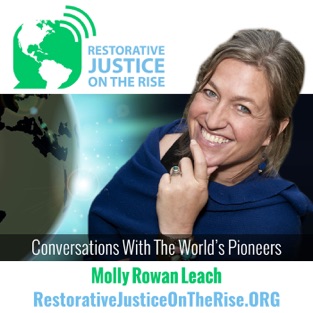
Peace Talks Radio
Paul Ingles
A monthly series on peacemaking and nonviolent conflict resolution. Stories that inform, inspire and improve the human condition.
- 59 minutesHealing Through Psychedelics
On this edition of Peace Talks Radio, we’re exploring the world of therapeutic psychedelic drugs. After a golden age of research in the 1950s and 1960s, research on therapeutic uses of psychedelics was grounded for much of the 20th century after they were classified as schedule 1 drugs. This classification means they have no medical use and a high potential for abuse.
In recent years, scientists have challenged those assumptions and this line of research has started to gain new momentum, with particular focus on how these substances may relieve suffering for people struggling with trauma and PTSD. Scientists are still trying to understand exactly how they work therapeutically, but believe substances like MDMA, psilocybin and LSD help the brain rewire in a way that allows new perspectives on psychiatric problems. While these drugs may be better known for their recreational uses, researchers say they have huge potential to help people struggling with mental health conditions that are sometimes resistant to other treatments, or require indefinite use, like antidepressant medications.
We’ll hear about this research and how therapists are integrating psychedelic use into their work with clients. Danielle Preiss talks with three guests who provide different perspectives on the therapeutic uses of psychedelic drugs. We’ll hear from Shannon Miller a therapist who works with people who are using therapeutic psychedelics and from Shawn, a humanitarian aid worker from the UK who tried a therapeutic mushroom trip herself. We will also hear from Dr. Jennifer Mitchell, a researcher working on this cutting edge science at the UCSF department of neurology and the San Francisco Veteran’s Administration.
5 September 2024, 1:42 pm - 59 minutesAI: The Risks and Benefits To Peace and Social Justice
Artificial intelligence is no longer merely a far-fetched feature of sci-fi, but a daily fixture in most American’s lives — whether we’re aware of it or not. Corporations and authorities are increasingly using A.I. in everything from employment and hiring, to economic decisions to surveillance and war. Police departments in some of the largest cities in the U.S. use predictive policing to forecast criminal activity, militaries use AI systems to help determine targets.
Yet humanitarian institutions and peace advocates are growing more interested in using AI to promote social good and peace. Proponents of AI for peace say that it could be harnessed for early warning of violence, combating hate speech, human rights investigations, and analyzing the effects of climate change on conflict. How do we build a world where A.I. is no longer a weapon of warfare, but a powerful tool for peace? Correspondent Mary Steffenhagen speaks with Yeshi Milner, founder and CEO of Data for Black Lives, and Branka Panic, founding director of A.I. for Peace, to find out.
5 September 2024, 1:39 pm - 59 minutesGun Violence Prevention
On this edition of Peace Talks Radio, we explore solutions to gun violence in the U.S. from three perspectives - academic, policy and on the streets. Since 2020 firearms have been the leading cause of death in the US for youth. One of the most promising models to address gun violence is Community Violence Intervention (CVI). CVI programs use a localized approach, identify those who are at the highest risk and work to reduce violence through targeted interventions and peer outreach.
Emily Cohen speaks with Chico Tillmon, PhD, of the University of Chicago’s Crime Lab and a leader in the CVI field, as well as Nick Wilson, a senior director for Gun Violence Prevention at American Progress, where he leads the organization’s efforts to reduce gun violence and shrink the footprint of the criminal justice system while improving public health and safety. Also featured are outreach workers Billy Deal, Rodney Phillips, James Mitchell and Nyedra Turner of the Metropolitan Peace Initiatives on their new podcast Streets, Beatz and Peace.
22 May 2024, 3:27 pm - 59 minutesSeeking Peace Through Intergenerational Connection
In this edition of Peace Talks Radio, correspondent Julia Joubert explores intergenerationl connection. Studies have shown that at least six distinct generations currently live side by side in the United States, and there are almost equal numbers of people of every age alive today. To put that into perspective, we have the same number of people who are seven years old as 70. Yet, while we might be the most age diverse we have ever been, age segregation is also at an all time high.
Rapid changes in technology, polarizing political views and isolating societal structures have resulted in a clear and growing generational gap. These divides are often fuelled by a lack of understanding as generations exist alongside each other but don’t have ways to connect meaningfully. But, the opportunity is there!
2 May 2024, 5:17 pm - 59 minutesMaking Peace with Body ImageOn this edition of Peace Talks Radio we explore peace and equality in body image. For centuries we have placed significant importance on beauty and body image. Society, media and pop culture often shape these views and set the standards by which we compare ourselves. But these standards are often exclusionary and unrealistic. A 2021 review by Psychologica Belgica suggests that rejecting beauty ideals, placing less value on appearance, and appreciating one’s body can contribute to a positive body image, but how do we do that in a society telling us our bodies aren’t beautiful?2 May 2024, 5:15 pm
- 59 minutesBridging Political Divisions
On this edition of Peace Talks Radio, we explore political division. Research shows that polarization isn’t just something we see in politics or with elected officials, but that it is affecting our relationships with family members, neighbors, and coworkers.
This program features voices from people working to mend this division and gives listeners tips to how ask “curious questions” to help find common ground. Emily Cohen speaks with Monica Guzman from Braver Angels, Alyson Spery from StoryCorps’ One Small Step program and Ron Gunzberger, former political director for Maryland Governor Larry Hogan.26 February 2024, 1:45 pm - 59 minutesNegotiating Towards Peace: To Release Hostages or Manage Our Daily LivesOn this edition of Peace Talks Radio, we’ll take a look at hostage negotiations. From criminal kidnappings to political pawns, hostage taking is a tragic business that captivates news readers and fills the plots of thrillers, and - as we've seen recently - it's often a core element between nations at war. But far from the dramatic scenes played out in movies and series, what is actually happening behind the scenes? How do hostage negotiators build rapport and trust and come to agreements with kidnappers? And how are these same tactics useful in lower stakes negotiations? Recent research supports the common sense hypothesis that some people have personality traits that make them better negotiators than others. Individual differences matter. But these traits are possible to change or develop through practice. We’ll hear about this research and how we can use it to improve how we perform in and feel about negotiating. We’ll also hear how a hostage negotiator and former hostage used these tactics in real life. Danielle Preiss talks with three guests who are deeply familiar with hostage situations and negotiations from three different perspectives. Dr. Hillary Anger Elfenbein, is a professor at the Olin School at Washington University and researches negotiation from the level of buying a car to negotiation for release of hostages. Sue Williams is a hostage negotiator who led the Kidnap and Hostage Negotiation Units for the Metropolitan Police in London. And Thomas Olsson was held hostage by Jabhat Al-Nusra, the Al-Qaeda affiliate in Syria, for one and a half years.23 January 2024, 6:06 pm
- 59 minutesSEEKING PEACE ON EARTH: A Peace Talks Radio Special (2023)It's a compendium of highlights from just one season in the long-running award-winning PEACE TALKS RADIO series. You'll hear clips from our series about "Reconciling Estrangement", "Homelessness Through a Peacemaking Lens", "Flipping Extremists to Bolster Peace", "Peacemaking in Relationships Amidst Health Challenges", "Truth and Reconciliation Commissions", and more.23 January 2024, 6:03 pm
- 59 minutesTwo Peace Books - by David LaMotte & J. Lawrence GrahamOn today's episode, correspondent Priyanka Shankar talks to songwriter, speaker and author David LaMotte, who wrote WORLD-CHANGING 101: CHALLENGING THE MYTH OF POWERLESSNESS and John Lawrence Graham, the author of the book CHARLOTTE'S WAR to understand each writer's views on peace, war, creative nonviolence and community peace-building in today’s world. Complete coverage on this and 250 other episodes in our series online at https://peacetalksradio.com1 December 2023, 1:43 pm
- 59 minutesPeacemaking in Estranged RelationshipsOn this edition of Peace Talks Radio, we explore the incredibly common yet largely undiscussed topic of estrangement. In a national survey, almost 30 percent of American adults reported cutting off contact with a family member. And 1 in 10 reported they’d cut off contact with either a parent or a child. Yet, despite how common it is, people who are estranged from friends or family often experience profound feelings of grief, loneliness and uncertainty. Estrangement can be both voluntary and involuntary, with some making the decision to end a relationship and protect themselves, and others feeling blindsided but someone else's choice. There are many roads to estrangement and just as many to reconciliation, yet neither are ever guaranteed, and that’s okay. Individuals who find themselves on a journey of estrangement should first pause to accept their true feelings, ground themselves in their core values and desires, and then begin to seek out empathic and open communication first with self and then with the people and communities they may find themselves estranged from. Julia Joubert speaks to American voiceover artist and comedian, Tina Marie, an adult child estranged from her father, and to Seattle-based podcaster, and estrangement and reconciliation coach, Kreed Revere, who was once estranged from her two daughters. And she speaks to Dr Aileen Fullchange, a licensed psychologist, certified school psychologist, and speaker.2 October 2023, 11:25 am
- 59 minutesTruth and Reconciliation CommissionsOn this edition of Peace Talks Radio, we’ll take a look at transitional justice through Truth and Reconciliation Commissions. We’ve looked at the topic of transitional justice in a 2021 episode, but now look at different examples of Commissions around the globe. From the most famous historical example of the Commission established to investigate abuses under the Apartheid era in South Africa, we’ll look at the evolution of the tool in countries like the Gambia and Colombia following conflict and transitions of power. A new trend is emerging of western democratic states establishing Truth and Reconciliation Commissions to look at historical abuses against indigenous and minority populations. Australia, Canada and Greenland have all concluded such Commissions in recent years. But we’ll take a deep dive into the Commission process in Norway, which is completing in 2023. From the mid-1800s to late in the 20th century, Norway forced assimilation of the indigenous Sámi population through an official “Norwegianization” policy. Traditionally reindeer herders across the Nordic region, the Sámi were forced to give up their own culture and language, particularly through a system of residential schools for Sámi children. Now, Norway is confronting the harms under that policy and its lasting legacy. Danielle Preiss talks with three experts who study transitional justice processes and their evolution including Dr. Elin Skaar, research professor at the Christian Michelsen Institute in Norway, Ereshnee Naidu-Silverman, Program Director of the Global Transitional Justice Initiative at the International Coalition of Sites of Conscience, and Dr. Gloria Ayee, a political scientist and lecturer at Harvard University.21 August 2023, 11:03 pm
- More Episodes? Get the App
Your feedback is valuable to us. Should you encounter any bugs, glitches, lack of functionality or other problems, please email us on [email protected] or join Moon.FM Telegram Group where you can talk directly to the dev team who are happy to answer any queries.
 The NVCpractice.com Podcast
The NVCpractice.com Podcast
 Building Peace 2010 to 2019
Building Peace 2010 to 2019
 Nonviolence Radio
Nonviolence Radio
 Restorative Justice On The Rise
Restorative Justice On The Rise